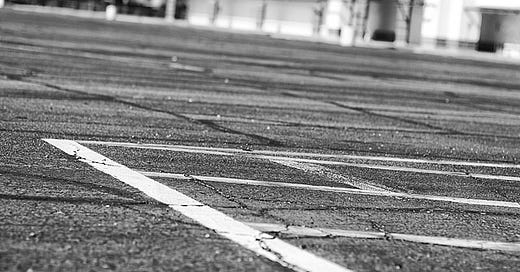On summer days, when the city feels confining and only water will keep the heat at bay, my family drives to a secluded mountain lake, some 45 minutes outside the city to swim. It’s a place known only to locals, strangely missing even from a topographical map of the area. My wife had once lived in the community and had swum there daily from May through September.
To get to the lake from Little Rock, we have to drive through the suburban edge of town. A place I remember as forest when I was in my Middle School years, with mixed hardwoods and a spot where I could reliably find green herons hunting along Rock Creek. Now its all box stores and neighborhoods, shotgun mansions and country clubs, mixed with a
partment complexes where those with HUD vouchers need not apply. Most of the street names are French, reflecting a mix of colonial heritage and haute aspirations.
Along the “Parkway” through this area, we pass a newly built strip mall. It was constructed a couple of years ago, the forest razed and prefab buildings with plenty of parking now sit in its place. We saw the construction at an interval of weeks as we passed by on various errands or attempts at escape from the city. Now, for all the effort, there’s nothing to show. The store fronts are empty and empty they remain.
There is a distortion of value at play in this scene. Somehow a person was able to acquire land, take out a loan from a bank, acquire city permits and build what is literally empty space on what had once been a teaming landscape. There are myriad ways we could analyze the wrongs at play, but the word that always comes to mind when I pass by is “sacrilege.” Those who built this strip mall for no one (or even if they had had a tenant) had no reverence for what they had displaced. The animals, trees, fungi, and myriad plants were simply an obstacle, a cost, to displaced for something of real value.
Projects such as this strip mall betray not only a lack of reverence but also a lack of gratitude. Strip malls exist in an economy free of gifts and so they are built operate as though nothing is given. But a life without gifts is no life at all. “We live by mercy if we live,” wrote Wendell Berry in his poem, “Amish Economics.” Such a recognition understands that life itself is a gift, laden already with meaning and value. Ours is the work of acceptance and gratitude. What value we make is only a part of this larger givenness, never a value created all on our own.
To understand that the value we make is always dependent upon, and in relationship with, the given value of the world is to adopt what Rowan Williams has called a stance of “communion rather than consumption.”[1] We cannot escape our use of the world. The fact that we cannot live by our own, self-generated energy, is a key aspect of our givenness. We, along with most other animals and fungi, must live from the energy made available from other creatures. The question is whether we will make use without abuse, will we adopt the posture of a lover, receiving in mutuality, or a rapist, taking in violence?
Reflecting on the Romanian theologian Dumitru Staniloae, Williams writes that when we receive creation as a gift, we “use it as a means of sharing the divine generosity with others.”[2] This sharing, because it is a sharing of the divine generosity, must cary with it some of the reverence owed to God. If a priest, blesses bread and gives it to me, then I share it with another not as just another piece of bread, but as something that is sacred, even if I had nothing to do with making it so. When we share in the gifts of creation, recognizing that we are part of that givenness, we are handling holy things. One simply can’t bulldoze a forest for a strip mall when the world is holy in this way. Our use must be more tenuous, it must be fraught with hard quandaries and questions that keep us from unnecessary destruction and construction.
As a priest, I deal constantly with the boundaries of holy things. When we have celebrated the Eucharist, what remains after communion has been shared must be treated differently than simple scraps, leftover crackers and wine. The wafers or bread that have been blessed must be consumed or else given back to the earth. The wine too must be shared or poured out on the ground. Each action must be done as soon after the Eucharistic celebration as possible. There is a good to having certain things live in this special, holy circle of the sacred. But I cannot exclude a forest from that circle. What if we could make use of it, consume it like the bread of the Eucharist as a means of grace, but never with the voraciousness of a glutton? What if our use was disciplined by our reverence?
When we have a sense of the great givenness of the world and the wonder that comes with it, our use of the world will not be focused on the maximization of returns. Instead, we turn our attention to reciprocity, preserving the gift that continues the giving. Rather than going to a place and extracting its value like a miner, or losing what is given by paving it over with the blank space of commercial property, we become like a good forager or hunter who is careful to collect only what is needed and to do so with attention to the perpetuation of the gift.
[1] Faith in the Public Square, 183
[2] Faith in the Public Square, 177




